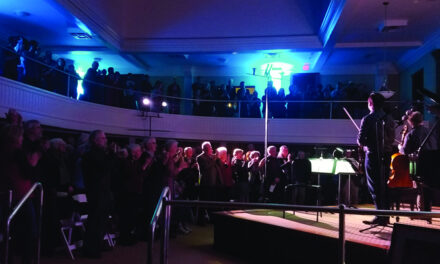Donizetti’s delightful L’elsir d’amore (The Elixir of Love), was a triumphantly successful production by the talented singers of the Fletcher Opera Institute at the University of North Carolina School of the Arts on Sunday afternoon before an audience which thoroughly appreciated the cast’s superb singing and acting, the excellent stage sets and costumes, and a fine orchestra which offered maximum support for the singers. Although I have been privileged to enjoy many excellent opera productions since I have been reviewing in Raleigh, none has exceeded this one for sheer artistry.
But there was a problem, a big one, which had nothing to do with the people on stage.
The performance began at two o’clock sharp with an audience which did not fill more than half the seats in the comfortable Fletcher Opera Theatre. When I arrived fifteen minutes earlier, I was dismayed to see only a handful of people in the theatre and dismissed the sparse number, assuming that everyone was just late. But by starting time there were still far too many empty seats. If this lack of audience support should continue, bad things will happen, dear readers — things like no opera. I know that there are many of you who might say, “Don’t worry; there will always be an opera.” Don’t you believe it.
So what did you miss, absentees? Everything that is wonderful about great opera productions.
I don’t always mention the importance of the musical director early in a review, but this time I must. James Albritten had everyone on stage and in the orchestra pit completely under his control, so that there was no annoying slowing of tempos by singers or instrumentalists wanting to move at their own musical pace. His direction of musical entrances and exits was especially precise and allowed for no hesitation by any of the soloists. His even pacing of the music for all the performers was perhaps his strong suit; he disallowed any unwarranted gaps between numbers, which result in an inevitable lack of forward motion of the drama.
The soloists displayed beautiful, well-trained voices that were an unalloyed pleasure to hear and acting ability that made their characters come to life as real people, not motionless trees standing around ready to be cut down. The three members of a lovers’ triangle — the wealthy, flighty farm girl Adina (soprano Jodi Burns), her suitor, farmer Nemorino (tenor Marvin Kehler), and another suitor, swashbuckling soldier Belcore (baritone Kyle Guglielmo*) — were witty, good comic actors, and for the most part excellent singers in roles which were fairly demanding. Especially is this true of Burns, whose character sang many frequently-difficult arias and spirited passages of dialogue in both acts. Her voice is beautifully lyric and seemed never to tire; she sang with great ease, color and power throughout her great range, and her scintillating high notes evoked many instances of applause from the audience. Adina is always the light-minded coquette, but Burns gave her a warmth we may not always find in other sopranos’ realization of her character.
It is ironic that the men who portrayed Adina’s two rivals shared a few vocal difficulties that have nothing to do with their characters. In his opening cavatina, “Quanto e bella!” Kehler had pronounced difficulties in moving between middle and upper registers which resulted in some popping and cracking, and also some high notes which clearly were out of his reach. By the time Kehler began to sing in Act II, however, the power and richness of his instrument was much in evidence, especially in the well-known, very beautiful romanza, “Una furtive lagrime,” the epitome of all soulful, melancholy tenor love songs. Kehler’s comedic skills were also entertaining, especially his drunken behavior after imbibing too much of the Bordeaux which he mistook for a love potion.
In his role as Belcore, Schumpert, too, had vocal problems, through not as many as Kehler. Schumpert’s character is the conventional soldier who sees a girl, decides she must belong to him, and moves in, even if he must present her with a bouquet carried in his gun barrel. In his first aria, “Come Paride vezzoso,” his jerky register shifts did not prevent him from conveying with conviction the pompous Belcore’s view of himself as Paris and Adina as the lovely Aphrodite, who succumbs to a noble hero’s love. Like Kehler, he sang very well in later appearances in the opera.
My favorite character was the quack doctor, Dulcamara, played admirably by bass Christopher Ervin. His comic behavior evoked peals of laughter from the audience and his patter songs, typical of such characters from Mozart’s Leporello through many similar types in Italian operas through the mid-nineteenth century, were extremely witty and demonstrated the amazing agility of vocal mechanism, lips and tongue which basses must utilize to bring these numbers to life. Perhaps the most well known of these, “Udite! udite o rustica!” in Act I, is a torrential rain of patter which seemed to come effortlessly from his lips at the same time he was smiling and watching the crowd of rustics for an easy mark.
There are many other people in the cast who deserve acknowledgement, especially Alona Metcalf, who as Adina’s friend and leader of the many country girls revealed a lovely voice possessing excellent clarity and projection, and the chorus, whose singing is the best opera choral sound I have heard in some time.
Note: For a review of an earlier performance in Winston-Salem click here.
*Edited/corrected 2/13/09, with thanks to the FOI’s Managing Director.











